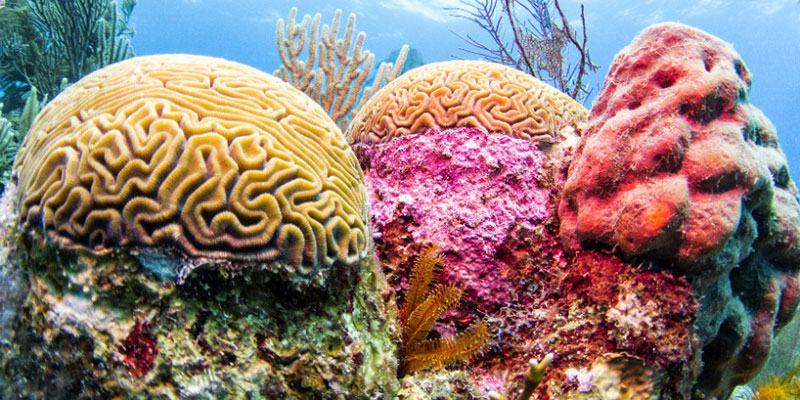The Mesoamerican Reef has a rich diversity of coral and creatures that are threatened by nutrient runoff and effluent flowing into the waters. Wastewater treatment could help the ecosystem maintain its delicate balance.
Decentralized wastewater treatment could alleviate threats to the world’s second-largest coral reef
Coral reefs are found in warm, nutrient-poor waters. These tropical marine ecosystems are rich in biodiversity, and the organisms there have adapted to the conditions. Nutrients from human activities can upset the delicate ecological balance on coral reefs with dire impacts to the ecosystems. The only way to stop the damage is to manage nutrient runoff and wastewater effluent flowing into the ocean.
A recent study examined nutrient pollution on the Mesoamerican Reef, the world’s second-largest tropical reef system after the Great Barrier Reef. It found that agricultural runoff and effluent from wastewater treatment plants were main contributors to nutrient loading in the region. The reef system, which extends for nearly 700 miles, is shared by Mexico, Belize, Guatemala, and Honduras. It is home to a diverse range of marine life, including critically endangered turtles and species that are important for local fisheries and tourism. The reef, and the industries it supports, are at risk of collapse from pollution, overfishing, and ocean warming.
Too Much Nitrogen Can Be Harmful
Nutrient pollution poses a threat to coral reef and seagrass. Any excess nitrogen, a known pollutant, causes “dead zones,” or oxygen-free areas that are accompanied by high acid levels, resulting in harmful conditions for aquatic life. Sindromé blanco, a pathogenic disease also caused by poor water quality, leads to the development of white lesions on the coral and kills them in a matter of weeks. Madeline Berger, a researcher at University of California Santa Barbara’s National Center for Ecological Analysis and Synthesis, explained to Environment Journal:
Our study highlights that different management strategies will need to be employed in different watersheds to help reduce nutrient input that can have detrimental impacts on coral reef and seagrass health in this area.
For the study, the researchers used a global wastewater model and a global model quantifying the ecological footprint of food production to compare nutrient inputs from wastewater effluent and agricultural production. They also took into account the contribution of millions of tourists who visit the region each year. They found that around 80% of coral reefs and 68% of seagrass beds were exposed to excessive nutrients in watershed plumes, most from agricultural runoff. While nutrient inputs from wastewater treatment plants were much lower than agricultural inputs, the researchers found that the watersheds that contributed higher levels of pollution tended to be near tourism hotspots.
Upgrading Wastewater Treatment
While tackling agricultural runoff requires more sustainable farm management practices, the impact of human wastewater can be minimized by upgrading wastewater treatment systems in ecologically sensitive locations.
Fluence’s wastewater treatment systems employ innovative technologies to significantly reduce nutrient loads, offering the perfect solution for small communities, holiday resorts, and remote locations. Membrane aerated biofilm reactor (MABR) technology is based on the diffusion of oxygen through membranes. Fluence’s compact Aspiral™ decentralized MABR plants have a small footprint with minimal impact on the environment. MABR technology is extremely energy-efficient and effective at removing nutrients from wastewater, reducing loads in effluent discharged into the environment.
The modular Aspiral™ plants are packaged in standard shipping containers, which are scalable and portable, and can be shipped anywhere in the world. They offer the perfect solution for treating nutrient-rich wastewater in sensitive watersheds and coastal regions.
For more information, contact Fluence. Our experts can help tailor a wastewater treatment solution that fits your needs and improves your impact on the environment.

